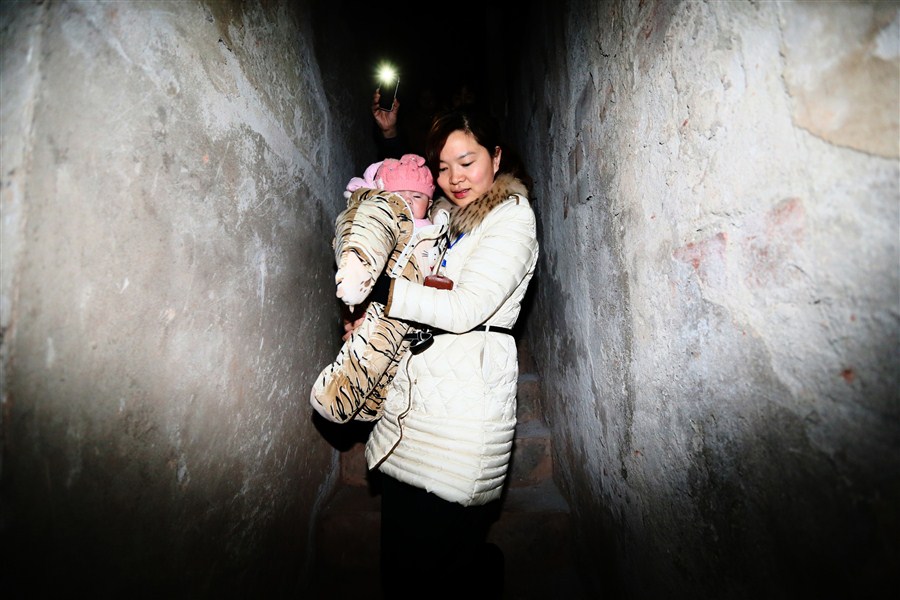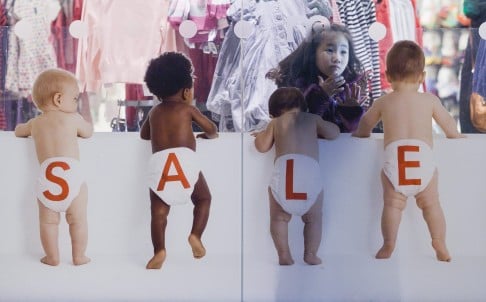- Joined
- Jun 9, 2013
- Messages
- 347
- Points
- 0
'Adoption' website raids save 382 babies
Shanghai Daily, March 1, 2014

A plainclothes policewoman carries a baby girl she and her colleagues traced to a villager's home in Leshan City in southwest China's Sichuan Province. The girl, less than a year old when she was discovered, was one of 382 babies that police rescued in coordinated raids on human trafficking networks in 27 provincial areas on February 19. The crackdown was related to four "adoption" websites and netted more than 1,000 people suspected of involvement in child trafficking, the Ministry of Public Security said.
A crackdown on four "adoption" websites has saved 382 babies from child traffickers, the Ministry of Public Security has said.
The babies will be cared for at children's welfare homes and sent back to their parents once police manage to trace them, it said.
Officers from 27 cities and provinces around the nation also seized 1,094 suspects in coordinated raids on February 19, the ministry said.
The ringleaders, two of whom were named as Zhou Daifu and Lan Xiaoqing, have admitted making huge profits from the illegal business, China Central Television reported.
Zhou and Lan, a couple in their 20s, ran one website, managed nearly 20 chat rooms and had an online shop falsely claiming to sell gold jewelry.
Seated in front of their computer in a shabby house in Zigong City in southwest China's Sichuan Province, they actually ran a baby trading operation, CCTV reported.
Zhou set up QQ groups to earn money.
"Basically, the website was operated by myself and others helped to manage QQ groups," he said.
QQ is an instant messaging software service developed by Tencent Holdings Ltd that also provides chat services.
People who wanted to adopt children would contact Zhou, and he would find people willing to sell their babies and act as middleman to help the infants get household registration, Xinhua news agency reported.
Zheng Hao, a Beijing police official, said people who bought babies via the website would pay Zhou 500 yuan (US$81) to 2,000 yuan as a "website maintenance" fee at his request.
The illegal business came to light when police received tip-offs online early last year.
Police found online chats about the baby trade and traced them back to Zhou.
The couple were caught in Lanzhou, capital of northwest China's Gansu Province, on February 19 and taken to Chengdu, Sichuan's capital, two days later.
Police didn't say how many cases the couple were involved in or how much they made from the business.
Human traffickers having increasingly turned to the Internet in recent years, making it harder for police to gather evidence, said Liu Ancheng, director of the ministry's criminal investigation department.
Many of the people who used the websites didn't realize they were "buying" babies, thinking that they were adopting legally.
"I had thought that website was legal," one woman who had been married for 10 years and was desperate to have a baby told CCTV. She came across a teenage couple wanting to give up their baby in a post on Zhou's website.
"They said they couldn't afford it and wanted to send it to others to look after," she said.
She met them in Chengdu and gave them 20,000 yuan for the baby girl in September last year. She thought that the money was an adoption fee, CCTV reported.
In another case in July last year, a man in his 50s surnamed Dong "adopted" a boy, born in breach of the family planning policy, from a resident of Huainan City in east China's Anhui Province. The boy's father, surnamed Chen, said he received 36,000 yuan.
Not long before, Dong had lost his son and posted online that he wanted to adopt a child.
In Sichuan, police caught 27 suspects and saved 13 babies. In Anhui, 43 suspects were caught, and 11 babies saved, CCTV reported.
Under China's adoption law, biological parents can only place their child for adoption when they are "in extreme difficulties and thus cannot raise the child."
A 2010 regulation issued by the Supreme People's Court and other government departments made it clear that those who "sell their biological children for the purpose of illegal profits shall be punished for child trafficking."
According to the China Population Association, at the end of 2012, 12.5 percent of people of childbearing age, or about 40 million people, suffered from infertility with many of them desperate to have a child.
From January to October last year, nearly 5,000 child trafficking gangs were busted and 24,000 children saved. With the help of DNA testing, 454 were returned to their parents, China Youth Daily reported.
Last edited:

